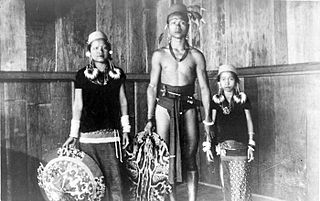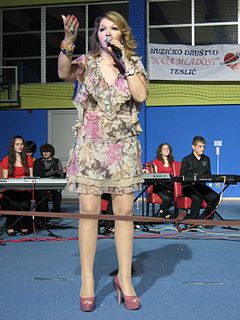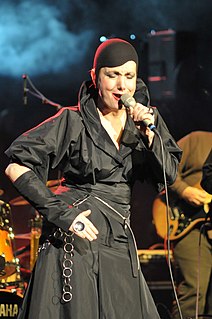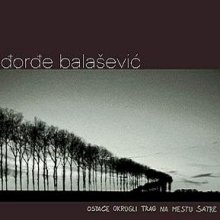
Bogdan Diklić is a Serbian actor active since the late 1970s who starred in over one hundred Yugoslav films and television series. Diklić made ten films with director Goran Marković. In August 2009, he received the Lifetime Achievement Award "Pavle Vuisic" for his body of work in Yugoslav cinematography.

Tereza Ana Kesovija is an internationally acclaimed Croatian recording artist. She is one of the most recognizable figures on the Balkan music scene, and is renowned for her wide vocal range and operatic style. She also had a successful career in France. She has held many concerts around the world, being one of the few Yugoslav musicians to have sold out shows in The Royal Albert Hall, L'Olympia and Carnegie Hall.

Sakib "Šako" Polumenta is a Montenegrin pop-folk singer popular throughout the former Yugoslav republics.
Alen Islamović is a Bosnian and a former Yugoslav musician and singer. Islamović is best known as the vocalist for the bands Divlje jagode from 1979 to 1986 and Bijelo Dugme from 1986 to 1989.
Lepo Sumera was an Estonian composer and teacher. Considered one of Estonia's most renowned composers along with Heino Eller, Eduard Tubin and Arvo Pärt, he was also his country's Minister of Culture from 1988 to 1992 during the days of the Singing Revolution.

Šemsa Suljaković is a Bosnian folk singer.
Željko Samardžić is a Hercegovien folk singer popular throughout the former Yugoslav republics. Born in Mostar, he reached fame only after the Bosnian War when he fled to Belgrade, Serbia, where he since lives and works.

The Kenyah people are an indigenous, Austronesian-speaking people of Borneo, living in the remote Baram, Data Kakus, Data Surau, Senap River, Long Dungan, Long Busang, Long Beyak, Bintulu, Miri, Asap River resettlement for Bakun Dam, Long Bulan, Long Jawe and Belaga regions in Sarawak, Malaysia and the remote Apau Kayan, Bahau (Bau), Benua Lama, Benua Baru and Mahakam regions in East Kalimantan, Indonesia.

Neda Ukraden is a Serbian pop singer born in Croatia, grew up in Bosnia and Herzegovina and is currently living in Serbia. Her professional career stretches back to 1967.
Olivera Katarina, also previously known as Olivera Vučo and Olivera Šakić, is a Serbian actress, singer and writer. She was one of the leading stars of Yugoslav cinema in the 1960s and the 1970s, and is probably the best known for her performance in Aleksandar Petrović's film I Even Met Happy Gypsies (1967), which won the Grand Prix at the 1967 Cannes Film Festival.
Izeta Selimović, known by her stage name Beba Selimović, is a Bosnian sevdalinka-folk singer and was one of the leading female singers of the 1950s, 1960s and 1970s in Yugoslavia, along with Zehra Deović, Nada Mamula and Silvana Armenulić.

Josipa Lisac is a Croatian pop-rock singer.

Dnevnik jedne ljubavi is the debut album by Croatian singer Josipa Lisac, released by Jugoton in 1973.

Ostaće okrugli trag na mestu šatre is a double compilation album released by Serbian and former Yugoslav singer-songwriter Đorđe Balašević.
Mirsada Bajraktarević, known professionally as Mirjana Bajraktarević, was a Yugoslav sevdalinka singer and songwriter. ethnicity and the sister of Silvana Armenulić and Dina Bajraktarević. Mirjana and Silvana died in a car crash.

20 is the twentieth studio album by Serbian singer Dragana Mirković. It was released on 4 December 2012.
The videography of Serbian recording artist Dragana Mirković consists of 135 music videos.

The Apo Kayan people are one of the Dayak people groups that are spread throughout Sarawak of Malaysia, East Kalimantan and North Kalimantan of Indonesia. The earliest Apo Kayan people are from the riverside of the Kayan River, Bulungan Regency, East Kalimantan, Indonesia. According to the Apo Kayan Dayak legend, the Kayan people are the forefathers of which all smaller sub-ethnic Dayak people that are found along the Kayan River came from. Today, the population of the Apo Kayan people are estimated about 64,900.
Anja Šovagović-Despot is a Croatian film and stage actress.












